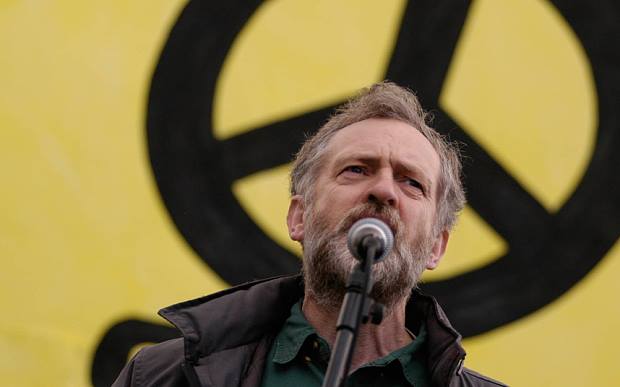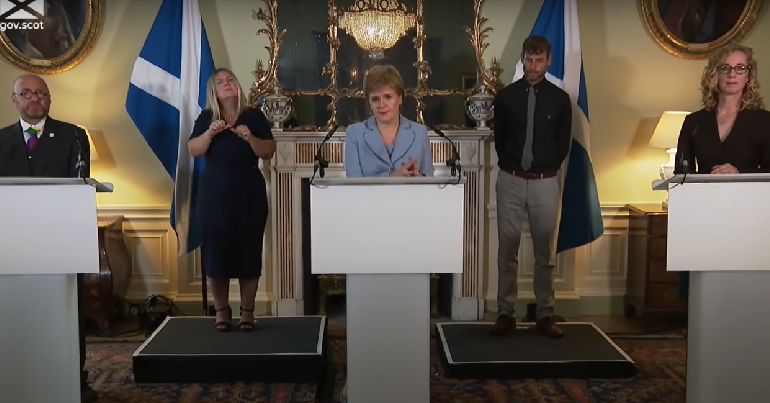Why Greens should support left-wing candidates and campaigns in other parties
With both Labour and the Lib Dems currently facing leadership elections, William Pinkney-Baird argues that Greens should support left-wing candidates and campaigns within these parties.

Over the past few weeks, the Labour Party’s leadership contest has been the subject of constant discussion in the news and social media. This contest was incredibly depressing, an argument between four Blairites on who could appeal to ‘aspirational’ people the most—until Jeremy Corbyn entered the field with his anti-austerity, pro-peace message.
Alongside this, the Liberal Democrats have their own leadership election. The candidates are Norman Lamb, representing continuity with the Lib Dems under coalition; and Tim Farron, seeking to distance the party from Nick Clegg’s leadership and move to a more centre-left position.
How should the Greens engage with these leadership contests? ‘If Labour or the Lib Dems (or the SNP in Scotland) move to the left, then surely they’d get votes that would otherwise go to the Greens?’ you might argue. Well, yes. That is true to an extent—at least in the short term. But in the longer term, if these parties move to the left, politics as a whole will move to the left, and that is nothing if not beneficial.
The consensus around austerity, cuts and privatisation that both Labour and the Lib Dems have helped to perpetuate could at last be challenged; the benefits of immigration and the need to bring an end poverty could be more widely championed in politics; and parties could recognise the urgency of dealing with climate change. While a move towards such policies could attract votes that might otherwise go to the Greens, this broader shift in the centre-ground of politics would ensure that the Greens are not a lone voice crying out in the desert, but part of a broader movement seeking to completely transform the political landscape.
From 1945 to 1979, the political landscape in Britain was almost unrecognizable. This period saw the creation of the modern welfare state in Britain (best represented by the National Health Service), it saw the nationalisation of industries, and it saw the trade unions as a major force within society. All of this changed dramatically under Thatcher, who cut away at the welfare state while deregulating businesses and the financial sector; privatisated left, right, and centre; and launched devastating attacks on the unions. This consensus was adopted by New Labour under Tony Blair, who began the privatisation of the NHS and the marketisation of education, continued the deregulation of business and finance, and failed to reverse the laws limiting trade unions. This Thatcherite/Blairite consensus is very much with us today, embraced by not only the Tories and UKIP, but very much so by the leadership of Labour and the Lib Dems as well.
I do not propose a return to the years of 1945. The decades that followed took the shape they did for a variety of historical reasons, and this period was no utopia, particularly for the groups who we marginalised and discriminated against by society. But it shows how the political consensus can change so dramatically, and the time has come in which we once again need to change this consensus.
The leadership contests represent a moment at which the future of both the Labour Party and the Liberal Democrats are in flux, a moment at which they can choose between two different paths. On one side, more of the same. On the other, the beginnings of a challenge to the current political consensus.
In Scotland over the past few years, we have seen just this process in action with the SNP. It has positioned itself to the left of the Labour Party, vocally opposing austerity, and it has been rewarded with a landslide last month. Partially because of the referendum—though it has been a much more long-term process—the entire political landscape in Scotland has been transformed. And in this landscape, the Scottish Greens have thrived, if not achieving a high vote in the Westminster election, at least placed to raise their representation in Holyrood from 2 to 10. Scotland shows that there is space for a spectrum of parties on the left, from the SNP to the Greens and the Scottish Socialists, with the latter two working to hold the former to account.
As Greens, surely we should support these parties in moving towards a more left-wing position, and thus moving the centre ground of politics with them? While I accept that the left-wing candidates winning the leadership election in these parties (or in the case of Labour, Jeremy Corbyn getting on the ballot paper and at least presenting an alternative message to the Labour Party) would not accomplish the structural changes that are needed in these parties for real change to happen, they are a beginning. And surely that would be better than a political landscape in which the Greens (and to a lesser extent, Plaid Cymru and the SNP) are the only real opposition.
While I support the efforts of groups such as Red Labour (which seeks to shift Labour to the left) I am cynical as to the extent to which this can be achieved. With things going as they are, it seems to be much more likely that Labour will meet a goal mirroring that of Pasok in Greece—a formerly centre-left party that embraced austerity and was swept away by Syriza. At the same time, their work helps shift the political narrative to the left, paving the way for the political landscape to move to the left, and that is something I will always support.




I disagree with this article, though for slightly different reasons to Barnaby. Like others, I would prefer – out of all realistic outcomes – to see a Labour-led government with a strong Green voice, and I don’t like us being too tribal about it. I’m also glad to see Corbyn in the mix.
However, William’s article is far too simplistic, both in its political analysis and its conception of the Green Party as the socialist conscience of the Labour Party.
To say that the SNP won a landsline in Scotland merely because it positioned itself to the left of the UK Labour Party and was anti-austerity ignores factors such as their time in the Scottish Government, the independence referendum (and the Labour Party’s appearing to side with the Tories), the talents of leading SNP figures like Nicola Sturgeon, and their ability to benefit in many places from a collapsing Lib Dem vote.
To infer, from Scotland, that a left-wing candidate could do similarly well across England or Wales is therefore even more wildly simplistic. Why did the Green Party and Plaid Cymru do so poorly in comparison? It’s even more simplistic to drop in a reference to Greece, a country with an unemployment rate many times higher than the UK, an economy in freefall, and a political system that is deeply and openly corrupt.
But more importantly, it’s simplistic – and in my view damaging – to position the Green Party simply as “a party of the left”.
Take Corbyn. I’m happy he’s running, his politics is clearly closer to ours than many in the Labour Party and he will enliven their internal debates. But his track record is limited: he is good on social justice and peace, but from what I can see on his web site, media reports and theyworkforyou.com has said very little about ecological issues or local democracy, two other fundamental principles.
Yes, he is left-wing, but no, he isn’t Green by any stretch of the imagination.
As Barnaby noted in his comment, a lot of our gains came – and could still come – from people who have previously chosen between Labour and the Lib Dems. A great many of them were attracted to the Lib Dems’ positions on civil liberties, climate change and local democracy, as much as their opposition to the Iraq war or their stance on tuition fees. I’ve noticed similar interests and concerns among new members who attend our meetings in London.
To lump all those people in as “left-wing” over-simplifies and blunts your analysis.
So I would alter your headline to, “why Greens shouldn’t be too tribal, and should support like-minded candidates and campaigns in other parties”.
Corbyn has been a member of the labour party throughout the Blair years. If true to his values he should have resigned.
I disagree with this article. It is not at all clear that the Greens will be able to gain support long-term if Labour and Lib-Dems both move significantly to the left. Most of our voters in 2015 were 2010 Lib Dem voters, who abandoned their party after its move to the Right to form the Coalition with the Tories. If the Lib Dems manage to convince those voters that the party is once again a left-wing socially liberal party then we’ll lose a lot these voters.
From surveys of where UK voters place themselves politically, the overall sum total has a slight left-wing majority. As William Pinkney-Baird claims, it is possible that by moving to the left Labour and the Lib Dems will be also shift politics as a whole in the UK to the left (by changing the political ideology of their voters). However, it will be very difficult for the Greens to win over these voters; the most reliable guide to how someone will vote is how they voted in the last election.
If the Lib Dems and Labour retake left-wing voters from the Greens then some of those voters will have their ideology shaped by these parties (compared to the Greens both parties will almost certainly still be more right-wing, pro-infinite consumerist growth on a finite planet and in Labour’s case more socially authoritarian on issues like surveillance, drugs etc). I believe that it would be better if the Green Party could help shift a large number of voters to be more radically left-wing, socially liberal and environmentalist and this requires that we hold onto our current support and gain a lot more. The only way I can see this happening is if Labour and the Lib Dems DO NOT move significantly to the left, in fact, it would ultimately be better if they moved to the right. If those parties move rightwards they will be competing more with the Tories and UKIP for the 45% of British voters who view themselves as right-wing, abandoning their left-wing voters.
A large amount of these abandoned left-wing voters will support the Green Party in 2020, as 2010 Lib Dem voters supported us in this election. We would stand a good chance of overtaking the Lib Dems and could erode Labour’s support significantly. Look at what happened in Greece: the radically left-wing Syriza went from 4.6% of the vote in 2009 to leading the Greek government today and their support came from left-wing voters pissed off with the failure of PASOK (the equivalent of the Labour Party in Greece) to pursue left-wing policies. I don’t expect anything as dramatic to happen in the UK but the point stands that it would be better for the Greens if the larger parties abandoned the Left, allowing us gain support and play a large role shaping left-wing public opinion.
This article is correct.
As a Green, I’d rather a proudly left wing Labour government with fewer Green votes than half a dozen Green MPs with politics staying dominated by the center right. The Greens should be about overcoming political factionism.
Disappointing that the greens in Wales refuse to support or cooperate with plaid cymru and even worse, martyn Shrewsbury, a member close to bartolotti has a blog dedicated to hammering plaid cymru and it’s members.
This is excellent, thanks William. I’ve been getting in the neck from Green friends because I’ve been really excited about Corbyn’s campaign, and Farron’s to a lesser extent. Reassuring/vindicating. Cheers.